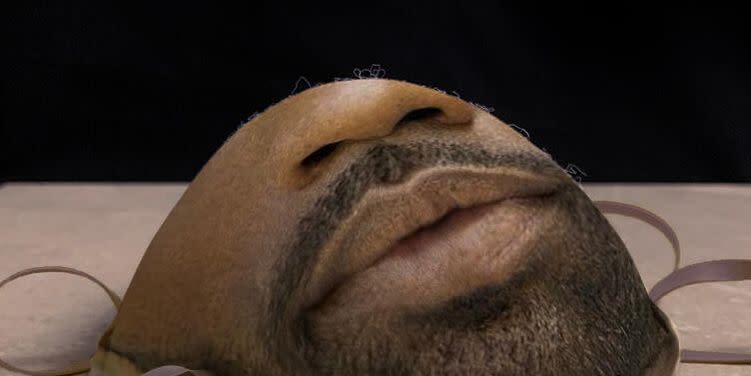Custom Respirator Masks Are Our New Bleak Reality

A San Francisco-based designer is creating custom N95 respiratory masks that will help protect against the Coronavirus.
The masks are specially printed to match the lower portion of your face so that facial recognition features on smartphones will still work while you're using the mask.
Danielle Baskin, the designer, says she won't begin production until the global mask shortage is under control.
Amid a worldwide shortage of N95 respirator masks to protect Chinese citizens from exposure to the COVID-19 virus—the official name for the Wuhan Coronavirus—a San Francisco-based designer has come up with a gimmick that won't just shield you from pathogens, but will also make you look like a walking art installation.
These custom respirator masks, called "Resting Risk Face," look exactly like you, meaning you can unlock your iPhone with FaceID without removing your protective gear and potentially exposing yourself to the virus.
"If you're sick, wearing a mask makes it hard to use your biometric data to access your phone," the creator, Danielle Baskin, writes on the Resting Risk Face website. She tells Popular Mechanics that she came up with the idea after having a conversation with her friends about the questionable effectiveness of masks in preventing viruses. By day, Baskin specializes in printing techniques for curved services for her companies Branded Fruit and Inkwell Helmets, so the idea seemed "obvious and doable" to her.
According to the U.S. Food and Drug Administration (FDA), an N95 respirator blocks at least 95 percent of very small airborne particles down to 0.3 microns (one micron = one millionth of a meter). "However, even a properly fitted N95 respirator does not completely eliminate the risk of illness or death," the FDA notes.
While other companies are already hard at work creating facial recognition technology that can identify mask wearers, Baskin says her solution is less complicated. Plus, it doesn't come with any of the pushback associated with the Chinese government's obsessive desire to surveil its citizens, which some say is fueling the development of AI that can identify masked individuals.
To get your custom mask, which costs $40, you'll have to first upload a photo of your face to Resting Risk Face's forthcoming mobile app. Natural light works best, according to the website, so you'll want to take your photo during the day. You'll then be able to preview the map of your face and tweak any alignment issues relating to how your facial features will look on the mask.
Made this service that prints your face on an N95 mask, so you can protect people from viral epidemics while still being able to unlock your phone.
😷+👃🏻👃🏽👃🏿👄=🔓https://t.co/SXslSjoiMz pic.twitter.com/rByMBwdPB8— Danielle Baskin (@djbaskin) February 15, 2020
Then, to print your face onto the mask, Resting Risk Face uses computational mapping, which is exactly what it sounds like: a way for computers to translate the pixels of your facial features onto the surface of a surgical mask without distortion. The mask's elastic band will also be made to match your skin tone. Resting Risk Face's printer uses inks made of natural, non-toxic dyes so it doesn't affect breathability.
But you'll have to wait to get your mask. Baskin wrote on Twitter that she doesn't "have plans to produce these *during* the global mask shortage." She added that there's a waitlist, with at least 1,000 people already interested, and no official launch date yet.
"Even though people think this product is something you'd see in Black Mirror, people still want it," Baskin says.
While this will help your friends identify you more easily, or help patients in finding their doctor, Baskin says that for facial recognition features to work on your smartphone, you'll have to add an alternate appearance to your FaceID settings (or equivalent settings on Android). This is pretty much the same deal as adding your face with or without makeup or another version of your face with a new set of glasses.
📲On an iPhone: Settings > Face ID & Passcode > Set Up an Alternate Appearance, then follow the onscreen instructions and take a photo of yourself in the mask.
📲On an Android device: Settings > Lock Screen menu > Improve Facial Recognition > tap Continue > take a photo of yourself in the mask.
As some users have pointed out on Twitter, Baskin should be careful in her data storage approach, since she will be handling sensitive facial biometrics. She says that she plans to build and use her own uploader tool to avoid a third party handling the data.
Beyond coronavirus concerns, Baskin says that folks working at hospitals or around chemicals always need masks, so she sees an ongoing user base for her creations. As for the rest of society, she sees a bleak future where we'll need to wear masks to protect ourselves from the effects of wildfires.
"...Years from now, as our air quality declines, we'll probably need better, more "industrial" masks," Baskin says. "So it's inevitable that masks become part of our fashion."
You Might Also Like

